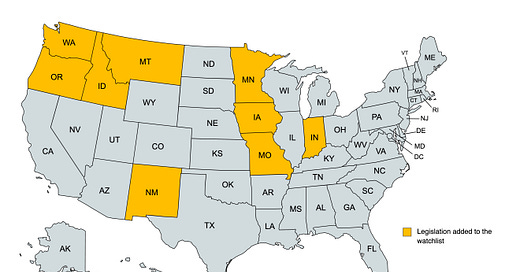The Hotlist Watchlist
State education legislation to watch for the week of February 27 - March 3
Thanks to everyone who shared positive feedback and suggested legislation for the Hotlist Watchlist. Your bill suggestions help clarify our collective understanding of the latest legislative developments in U.S. education policy.
This week, the 16 new bills cover early childhood education, early literacy, parents’ rights, gender identity, governance, accountability, and school choice. The bills represent a familiar tension in legislatures, whether to restrict or expand student opportunities.
For example, a New Mexico bill incites concern over an attempt to remove essential graduation requirements, like Algebra II (read more from NMKidsCAN). While Washington legislators expand their Running Start program, so 10th graders can earn higher education credits in high school.
Most statewide education policies have a fiscal impact on local school districts, leaving legislators with a vital question to consider: Is this policy going to provide a cost-effective approach to addressing the inequity or challenge we are trying to solve?
Two bills in Oregon beg this question. Oregon HB 2753 allows district school boards to choose whether to provide a stipend for school board members. Oregon HB 2750 prohibits school districts from charging fees for students participating in interscholastic activities. Both bills remove barriers for historically underserved communities. Yet, if implemented haphazardly, they may burden school districts with negative financial tradeoffs.
FEATURED LEGISLATION
MN SF 494 requests $7,650,000 to fund 30 new Minnesota schools implementing the BARR (Building Assets and Reducing Risks) system. BARR is an evidence-based, research-validated program that provides school coaching, professional development, and curriculum for students’ social, emotional, and mental well-being.
Read the Youth Risk Behavior Survey Report: 2011–2021 for the latest national youth-mental health crisis data.
You can learn about the BARR Center program.
IN HB 1428 establishes a system allowing each of the state’s nearly 300 school districts to decide whether to require candidates to declare a political party.
The latest American School District Panel report explores how schools navigate political tensions.
NM HB 481 creates a new fund for districts to adopt high-quality instructional materials aligned to the science of reading at no cost to the school district.
Explore Excel in Ed’s literacy bill tracker.
Read a 2019 report via Results for America and Chiefs for Change documenting Nevada’s journey toward implementing the science of reading statewide.
Thank you for reading the Hotlist Watchlist. Please forward me suggestions of bills to add or follow and let me know if topics, tags, or important takes need to be included.
Dr. Christine M. T. Pitts serves as Director of Impact and Communications at the Center on Reinventing Public Education, overseeing policy leadership and external affairs. A teacher and researcher by training, she previously led research and evaluation for Portland Public Schools. Pitts also served as Policy Advisor at NWEA, overseeing state and federal policy to advance equity and innovation in educational assessment. Follow her for more updates on Linkedin, Instagram, and Twitter.






